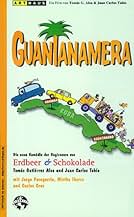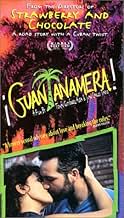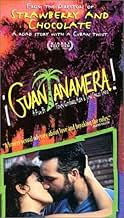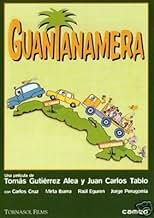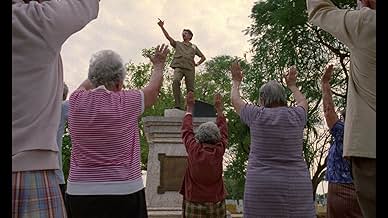ÉVALUATION IMDb
6,9/10
1,6 k
MA NOTE
Film satirique sur la vie à Cuba. Les membres d'un cortège funèbre et des chauffeurs de camion se mettent à discuter de Dieu et du monde, découvrant combien leurs vies sont à la fois différe... Tout lireFilm satirique sur la vie à Cuba. Les membres d'un cortège funèbre et des chauffeurs de camion se mettent à discuter de Dieu et du monde, découvrant combien leurs vies sont à la fois différentes et similaires.Film satirique sur la vie à Cuba. Les membres d'un cortège funèbre et des chauffeurs de camion se mettent à discuter de Dieu et du monde, découvrant combien leurs vies sont à la fois différentes et similaires.
- Directors
- Writers
- Stars
- Prix
- 7 victoires et 1 nomination au total
Luisa Pérez-Nieto
- Marilis
- (as Louisa Pérez Nieto)
José Ángel Espinosa 'Ferrusquilla'
- Justo
- (as Jose Antonio Espinosa)
Rubén Breña
- Rivero
- (as Rubén Breñas)
Avis en vedette
Hearing the word Guantanamera, a word surge raced through my mind; Cuba, Guantanamo prison, Guatemala, or one of the most common Latin American songs? What could it be? I wondered. It is not much of the above but a sound track to a road movie Guantanamera, a death and love story.
In matters pertaining to birth, death and burial, people may not choose the place of birth or death, but they chose where they want to be buried. And this becomes a central issue in this road movie. It portrays the core values of a typical traditionalist Cuban family in a socialist country. It is for this reason that a dead body gets flown either out of state or country for burial. A song (Guantanamera), well spiced and crafted to fit each and every moment and character plays throughout the movie. This movie exposes the economics of a socialist run country. Road side vendors price their items in dollars. This suggests the instability of the national currency (possibly inflation).
When Gina puts on a new dress and let her hair run loose, it symbolizes self discovery and a sense of freedom. For the first time in this movie, she stands up to her husband and tells him that the days of subordination are over, she would not take off her dress. But also this could or symbolize people who live under a communist run regime, that there is limited freedom of choices. Those who are fed up of the system migrate, or export themselves to America through illegal means.
The directors did a great job in telling the general public about the flaws of a communist run country; corruption, dilapidating buildings and failed economy. Also the directors employed an excellent editing technique MONTAGE. Gina paces up and down and finally walks away from the funeral and finds comfort and love in Mariano. Both Gina and Mariano ecstatically share a smile and laughter whilst the funeral is still in procession. The MONTAGE suggests the anguish of people in Cuba go through in deserting their beloved country in search of freedom and better life.
In matters pertaining to birth, death and burial, people may not choose the place of birth or death, but they chose where they want to be buried. And this becomes a central issue in this road movie. It portrays the core values of a typical traditionalist Cuban family in a socialist country. It is for this reason that a dead body gets flown either out of state or country for burial. A song (Guantanamera), well spiced and crafted to fit each and every moment and character plays throughout the movie. This movie exposes the economics of a socialist run country. Road side vendors price their items in dollars. This suggests the instability of the national currency (possibly inflation).
When Gina puts on a new dress and let her hair run loose, it symbolizes self discovery and a sense of freedom. For the first time in this movie, she stands up to her husband and tells him that the days of subordination are over, she would not take off her dress. But also this could or symbolize people who live under a communist run regime, that there is limited freedom of choices. Those who are fed up of the system migrate, or export themselves to America through illegal means.
The directors did a great job in telling the general public about the flaws of a communist run country; corruption, dilapidating buildings and failed economy. Also the directors employed an excellent editing technique MONTAGE. Gina paces up and down and finally walks away from the funeral and finds comfort and love in Mariano. Both Gina and Mariano ecstatically share a smile and laughter whilst the funeral is still in procession. The MONTAGE suggests the anguish of people in Cuba go through in deserting their beloved country in search of freedom and better life.
If you care about the evolution of thinking regarding social organization, you will necessarily have to go through the biggest fracture in the post-ww2 world. the iron curtain. it's up to you making your own opinion regarding what each side had to offer, and which sides on each side you support. To help you make up your mind you have to rely on the stories told by those who lived in the flesh the problems and advantages of those worlds. I mean the honest thinkers, or people with honest stories to tell. If you deepen your research on the soviet branch of the curtain, you will necessarily face the cuban case. It's a fascinating story. And within that story, there are a few honest storytellers. Korda, and Gutierrez-Alea are the most meaningful, they work with images. But while Korda is fundamentally important because he followed the process, the revolution, Gutierrez is someone who was at the beginning, and kept telling his honest version of the reality until his death. Just before that, he made this beautiful film.
So, we know we will watch in his films the narrative of someone who never ceased to make questions, and denounce what he believed was bad, as much as he had denounced the pre-Castro abuses, and as much as he had genuinely embraced the revolution. This is his vision, in the mid 90'. Disenchanted, cynic, ironic. Few times has the road-trip been so metaphorical, so invested with the notion of journey, through time(s), hardly through physical space. Also you can invest any symbolic weight to the corpse they transport. But what i care about is the pure talent Alea had as a true cinematic storyteller. My bet is that he started with images, loose disconnected images that he wanted to pass. Just like the final shot in this film. Than he worked hard on building a narrative structure than could competently, coherently and, y say, poetically, integrate all his multiple visions. The fun thing about his film is that the multiplicity of visions from the same beautiful mind is reflected in the various story lines we follow, each with its own tone, and mode. We have the soap opera story that surrounds the funny life of Mariano, multiple women that mean sex, to him, and one platonic love, reluctant to be consumed. We have the cynic critic to the regime totally invested in the stupidity of the whole funeral service business. That business about inventing rules to spare fuel; all that represented by the frigid bureaucratic husband, a sad portrait to a by now (and than) sad system. Than the heaviest drama falls upon the most delicate soul in the living characters, the old widow, husband to a late artist, the one who never ceases to care about people, eventually the one true love in the story (i'm not sure to consider the teacher a woman in love). Alea doesn't spare on the cynic posture, so the black humour with the corpse, near the end, really grows an uneasy feel on you. All these lines are perfectly integrated by a well managed road trip, and a good adaptation of an eternal song, which incidentally is an avatar for the cuban soul.
This is like an Italian post-modern "sweet" film, but better, because it is more meaningful.
My opinion: 4/5
http://www.7eyes.wordpress.com
So, we know we will watch in his films the narrative of someone who never ceased to make questions, and denounce what he believed was bad, as much as he had denounced the pre-Castro abuses, and as much as he had genuinely embraced the revolution. This is his vision, in the mid 90'. Disenchanted, cynic, ironic. Few times has the road-trip been so metaphorical, so invested with the notion of journey, through time(s), hardly through physical space. Also you can invest any symbolic weight to the corpse they transport. But what i care about is the pure talent Alea had as a true cinematic storyteller. My bet is that he started with images, loose disconnected images that he wanted to pass. Just like the final shot in this film. Than he worked hard on building a narrative structure than could competently, coherently and, y say, poetically, integrate all his multiple visions. The fun thing about his film is that the multiplicity of visions from the same beautiful mind is reflected in the various story lines we follow, each with its own tone, and mode. We have the soap opera story that surrounds the funny life of Mariano, multiple women that mean sex, to him, and one platonic love, reluctant to be consumed. We have the cynic critic to the regime totally invested in the stupidity of the whole funeral service business. That business about inventing rules to spare fuel; all that represented by the frigid bureaucratic husband, a sad portrait to a by now (and than) sad system. Than the heaviest drama falls upon the most delicate soul in the living characters, the old widow, husband to a late artist, the one who never ceases to care about people, eventually the one true love in the story (i'm not sure to consider the teacher a woman in love). Alea doesn't spare on the cynic posture, so the black humour with the corpse, near the end, really grows an uneasy feel on you. All these lines are perfectly integrated by a well managed road trip, and a good adaptation of an eternal song, which incidentally is an avatar for the cuban soul.
This is like an Italian post-modern "sweet" film, but better, because it is more meaningful.
My opinion: 4/5
http://www.7eyes.wordpress.com
When his wife's aunt dies, mortician Adolfo uses the opportunity to show his political talent by trying out a new, very communist` way of transporting the body. On the way, lots of different things happen to him, the dead body, his wife and the aunt's mourning admirer, and Adolfo is close to getting mad because he fears he won't be able to realize his time schedule. His character is good for a smile.
The Cuban film Guantanamera` wants to be everything: comedy, romance and a satire on the communist system in Cuba. It's half-baked but ... nice. And I was surprised about the actors: they did a good job and obviously they enjoyed it.
The Cuban film Guantanamera` wants to be everything: comedy, romance and a satire on the communist system in Cuba. It's half-baked but ... nice. And I was surprised about the actors: they did a good job and obviously they enjoyed it.
Interesting satire on the Cuban bureaucracy. During the special period. Undresses the weakness of communist systems and their inability to provide logical answers within their rigid structure.
It is one of Titon's last works. But you can see the hand of the best Cuban film director. An excellent acting collective bringing together many of the best actors available at that time on the island. It is not the best film of its director but it makes it a adjustable time. The skinny part is that its problems are very local, which means that it is not received abroad as a strawberry and chocola by example. Also that limitation in time and space means that over the years I go losing the luide and the sympathy of its extreno.
It is one of Titon's last works. But you can see the hand of the best Cuban film director. An excellent acting collective bringing together many of the best actors available at that time on the island. It is not the best film of its director but it makes it a adjustable time. The skinny part is that its problems are very local, which means that it is not received abroad as a strawberry and chocola by example. Also that limitation in time and space means that over the years I go losing the luide and the sympathy of its extreno.
A small look at life in Cuba, "Guantanamera" portrays a world-famous Cuban singer returning to her hometown and suddenly dying. Her funeral procession reveals several things about the people involved, namely the love-starved existence of a woman sick of her creepy husband.
Obviously, we in the United States only get to hear about Cuba occasionally, so at the very least this movie should provide some insight into the state of affairs there (or just to hear the Cuban dialect, with its dropping of esses). But anything looking at people's individuals lives and how policies have affected them gets praise from me. We see how people have to abide by food rationing, among other things (of course, this is mainly due to the US blockade against the island). So I recommend this film.
Obviously, we in the United States only get to hear about Cuba occasionally, so at the very least this movie should provide some insight into the state of affairs there (or just to hear the Cuban dialect, with its dropping of esses). But anything looking at people's individuals lives and how policies have affected them gets praise from me. We see how people have to abide by food rationing, among other things (of course, this is mainly due to the US blockade against the island). So I recommend this film.
Le saviez-vous
- AnecdotesFinal film directed by Tomás Gutiérrez Alea.
- ConnexionsReferenced in Minuit (1998)
Meilleurs choix
Connectez-vous pour évaluer et surveiller les recommandations personnalisées
- How long is Guantanamera?Propulsé par Alexa
Détails
Box-office
- Brut – États-Unis et Canada
- 903 840 $ US
- Fin de semaine d'ouverture – États-Unis et Canada
- 8 851 $ US
- 6 juill. 1997
- Brut – à l'échelle mondiale
- 903 840 $ US
Contribuer à cette page
Suggérer une modification ou ajouter du contenu manquant


